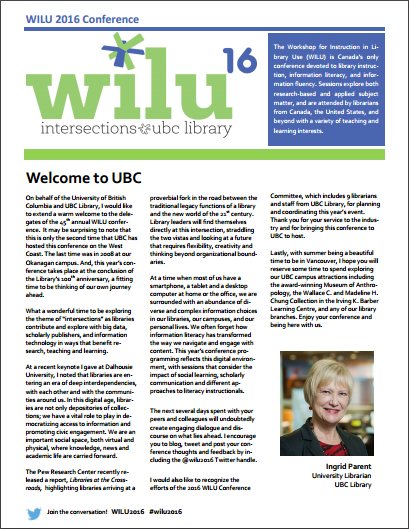The Workshop for Instruction in Library Use, commonly known as WILU, is an annual Canadian conference where delegates meet to discuss timely topics related to information literacy.
In May 1972, five Canadian participants at a conference on library instruction in Ypsilanti, Michigan met and discussed ways to share their experiences with other Canadian librarians.
Within a few months, the following members formed a steering committee:
- Boris Chumakov (York University)
- Richard Dewey (Sir George Williams University, now Concordia University)
- Lucie Greene (University of Western Ontario)
- Patricia Grieg (University of Western Ontario)
- Sheila Laidlaw (University of Toronto)
Based on enthusiastic comments received from participants at a workshop that occurred in August 1972, a basic set of guidelines was established:
- The conference initially targeted staff and librarians from universities and colleges in Ontario and Quebec (today WILU attracts librarians from across Canada and the US, and beyond)
- A committee was to formed with representation from several different institutions (today, oversight passes from one hosting institution to the next)
- The workshop would (and still does) exist independently from library organizations, in order to facilitate “grass roots” participation at the lowest possible cost
- The workshop would emphasize experiences and learning (today, WILU blends practical experience and learning with meaningful theory and research)
- “Outside” speakers were meant to be kept at a minimum and input sought from faculty members and students for whom library instruction was designed
- The registration fees were (and still are) set as low as possible, with campus accommodation when possible (major contributions from hosting institutions as well as corporate sponsors have traditionally helped to keep registration fees low)
- The conference would operate on a cost-recovery basis, with seed money passed from one host to the next (these standards continue today)
WILU continues to evolve and redefine itself as Canada’s premier information literacy conference and now attracts attendees and speakers from Canada and the world over.
Past Hosts
| 2017 | University of Alberta
|
| 2016 | University of British Columbia – Intersections
|
| 2015 | Memorial University – sea change
|
| 2014 | Western University – e-magine the possibilities
|
| 2013 | University of New Brunswick – Synchronicity – The Time is Now
|
| 2012 | Grant MacEwan University – Vigour, Thrift and Resourcefulness
|
| 2011 | University of Regina – Learning Under Living Skies
|
| 2010 | McMaster University – Design, Play, Learn
|
| 2009 | Concordia University – Reflections
|
| 2008 | UBC Okanagan – Information Literacy Uncorked
|
| 2007 | York University – Teach Every Angle
|
| 2006 | Acadia University – Charting a Course for Instruction
|
| 2005 | University of Guelph – A Kaleidoscope of Possibilities
|
| 2004 | University of Victoria – Theory Meets Reality
|
| 2003 | University of Windsor – Bridging the Gap: Teaching Across Boundaries
|
| 2002 | University of New Brunswick – River Runs: Trends in Library Instruction
|
| 2001 | Carleton Unversity – Teaching Using Learning in a Pluralist Setting
|
| 2000 | University of Western Ontario – Literacy for the Infollennium
|
| 1999 | McGill Unversity – Process of Integrating Library Instruction into the Curriculum in Partnership with Our Teaching Colleagues
|
| 1998 | Queen’s Unversity – Libraries at the Heart of Learning
|
| 1997 | University of Montreal – Gateways to the Information World
|
| 1996 | Wilfrid Laurier University – Anticipation: Library Instruction for Changing Times
|
| 1995 | Université Laval |
| 1994 | University of Ottawa – Making Connections
|
| 1993 | University of Toronto – Library Instruction: Strategies for Success
|
| 1992 | University of Windsor – Skills for Change
|
| 1991 | Concordia University – From Yesterday to Tomorrow
|
| 1990 | Brock University – The Challenge of the 90’s
|
| 1989 | Bishop’s University & Champlain Regional College – The Art of Library Instruction
|
| 1988 | University of Waterloo & Wilfrid Laurier University – Teaching and Learning in the Present Tense
|
| 1987 | McMaster University & Mohawk College – Re-Creating the Image
|
| 1986 | John Abbott College – Connections Linking the Library Instruction Network
|
| 1985 | University of Western Ontario & Fanshawe College – Reaching Out: New Directions in Library Instruction
|
| 1984 | Queen’s University & St. Lawrence College – Coping with Crisis: Strategies for Survival
|
| 1983 | Carleton University & Algonquin College – Exploring the New Technology for Library Instruction
|
| 1982 | University of Toronto – A Learner-Centred Approach to Teaching
|
| 1981 | University of Guelph – Approaching Instruction Effectively
|
| 1980 | McGill University – Staff Development, Computerized Services, Part-time and Non-traditional User, Marketing
|
| 1979 | University of Waterloo – Teaching the Use of the Library: Instructional Strategies That You Always Wanted to Know But Were Never Taught
|
| 1978 | University of Ottawa – Approaches to Library Instruction: Do You Know What Your Colleagues Are Doing?
|
| 1977 | York University – Marketing the Library, Selling the Library as Part of the Teaching Learning Process |
| 1976 | Queen’s University – The Librarian as Teacher: Planning, Teaching, and Evaluating Library Programs
|
| 1975 | McMaster University – Printed Materials
|
| 1974 | University of Toronto – Audio-Visual Techniques
|
| 1973 | McGill University & Sir George Williams University (now Concordia University) – Communication and Learning Theory |
| 1972 | University of Western Ontario – General Overview of Orientation
|

 Follow
Follow